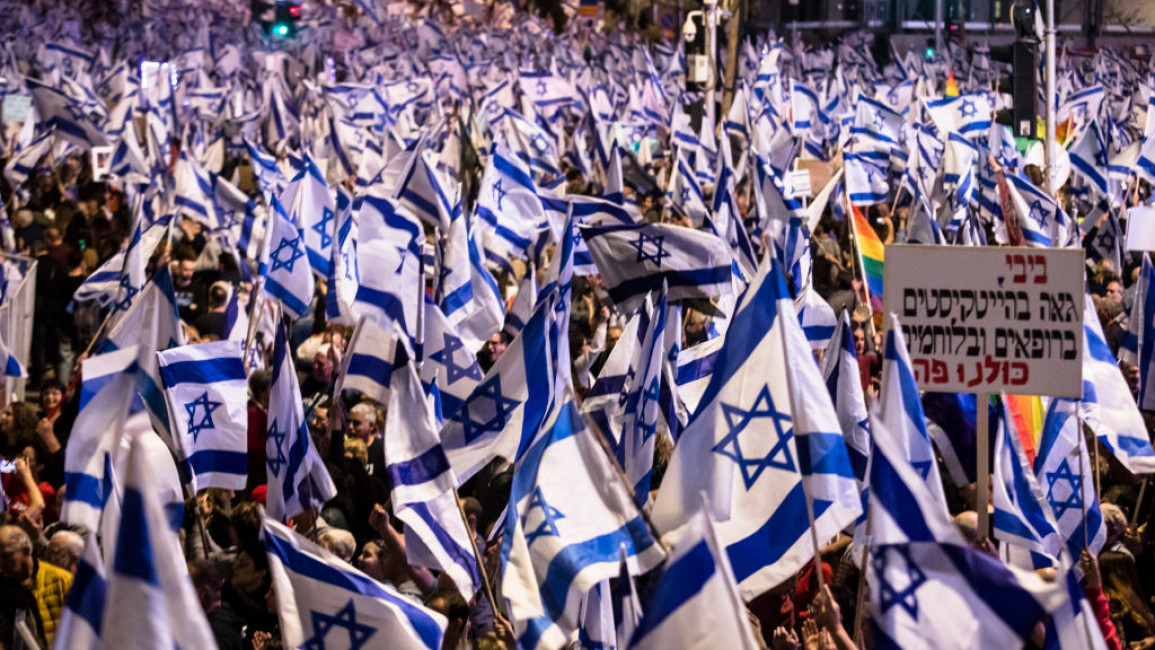
The problematic framing of Israel protests as a 'fight for democracy'
The Israeli government’s successful passage of a law restricting an aspect of the Supreme Court’s powers in late July, against a backdrop of planned further changes to the judiciary and months of major protests against such changes, prompted a significant amount of global media interest.
Many headlines and analysis pieces returned to a theme familiar from earlier in the year, when Prime Minister Benjamin Netanyahu’s coalition government embarked on its drive to alter aspects of the judicial system and its relationship to the government and legislature.
It is a theme which echoes the message of the mass demonstrations, letters of concern, statements, and other forms of opposition, coming from Israeli business leaders, former military security and intelligence officials, and large swathes of the Jewish Israeli public: democracy is under threat.
''Apartheid requires accountability, and solidarity with its (Palestinian) victims. A ‘battle for democracy’ in Israeli society, by contrast, dilutes or even disappears such clarity, inviting those looking on from afar to identify with and support a protest movement that features many of those responsible for, inter alia, the colonisation of the West Bank.''
More specifically, there has been an aspect of Western-oriented, English language analysis over the last few weeks which is worth highlighting, because of what, unfortunately, it obscures.
The framing in question posits the struggle between the proponents and opponents of the judicial overhaul as a battle between populist nationalists and liberal democrats respectively.
“Israel has become the test case in the global fight against ultranationalist populism”, read one column in The Guardian, which described the unfolding drama as “part of a wider struggle against what is now…an international phenomenon: ultranationalist populism.” The column added: “everyone who cares about democracy…should desperately want those protesters to succeed.”
Another piece in The Guardian, noting how “zero-sum polarisation isn’t unique to Israel”, referenced the experiences of people in other “countries whose democratic potential is slipping away”, while an op-ed in The New York Times set Israel’s “political drama” against a backdrop of “elected governments around the world…finding legal avenues to create autocratic regimes.”
For some, this means comparisons to places like Hungary and Poland, analogies also embraced by many in the Israeli protest movement itself. As one commentator put it bluntly in The Washington Post: “Israel is now an increasingly illiberal, and difficult, ally: the Hungary of the Middle East.”
For others, the ‘go to’ comparison is between Benjamin Netanyahu and Donald Trump – an analogy also favoured by some Israeli opponents of the judicial overhaul; as a Haaretz column put it, “both countries [i.e. US and Israel] are experiencing threats and attacks on the very foundations of liberal democracy that are extremely similar in style, content, rhetoric and sequence.”
There is a lot to unpack in this kind of framing, but one thing was striking in these pieces by its almost complete absence: apartheid.
Such an absence, especially in liberal publications, is noteworthy given that the two largest global human rights organisations, Human Rights Watch and Amnesty International, both published landmark reports in April 2021 and February 2022 accusing Israel of the crime of apartheid.
These reports are in parallel, or subsequent, to years of detailed documentation, scholarly research, and other forms of human rights reporting, by some Israelis and many Palestinians, which analyse Israeli laws, practices, and political structures as constituting a form and/or crime of apartheid.
Thus, just as an apartheid analysis has been gaining mainstream ground – and in the human rights community, approaching a consensus – some are now presenting ‘the’ story of what is happening in Israel right now as one of fanatic autocrats versus democrats, a battle even described as one of the most important such struggles taking place in the world today.
No wonder, as Haaretz reported on 13 August, that Israel’s foreign ministry see the protests as “beneficial to Israel’s international image”, telling Israeli diplomats abroad to present the demonstrations “to foreign audiences as a testament to the strength of Israeli democracy.”
Interestingly, in parallel to a surge in pieces with a narrative of populists versus democrats, talk of apartheid has emerged from some unlikely quarters – a recent open letter has been signed by dozens of academics, including Israeli historian Benny Morris. Meanwhile, Benjamin Pogrund, a South African-Israeli who has spent decades denouncing any talk of Israeli apartheid, has just published an article arguing the opposite (using similar arguments to the ones he had previously dismissed).
Apartheid requires accountability, and solidarity with its (Palestinian) victims. A ‘battle for democracy’ in Israeli society, by contrast, dilutes or even disappears such clarity, inviting those looking on from afar to identify with and support a protest movement that features many of those responsible for, inter alia, the colonisation of the West Bank. Tellingly, Shikma Bressler – dubbed “the face of Israel’s protests” – last month used a comparison to places like Hungary and Poland precisely in order to deny a connection between the judicial overhaul and occupation.
Any analogies have limitations, but the rush to see the Israeli protest movement – one that is at its core a “revolt for the status quo” – as on the frontline of a global battle against populist autocracy is particularly unhelpful with respect to what it obscures. Israel is more like the old South Africa than it is to being a new Hungary, and it is a state of affairs that goes back decades, not eight months.
Ben White is a writer, analyst, and author of four books, including ‘Cracks in the Wall: Beyond Apartheid in Palestine/Israel’.
Follow him on Twitter: @benabyad
Have questions or comments? Email us at: editorial-english@newarab.com
Opinions expressed in this article remain those of the author and do not necessarily represent those of The New Arab, its editorial board or staff.




